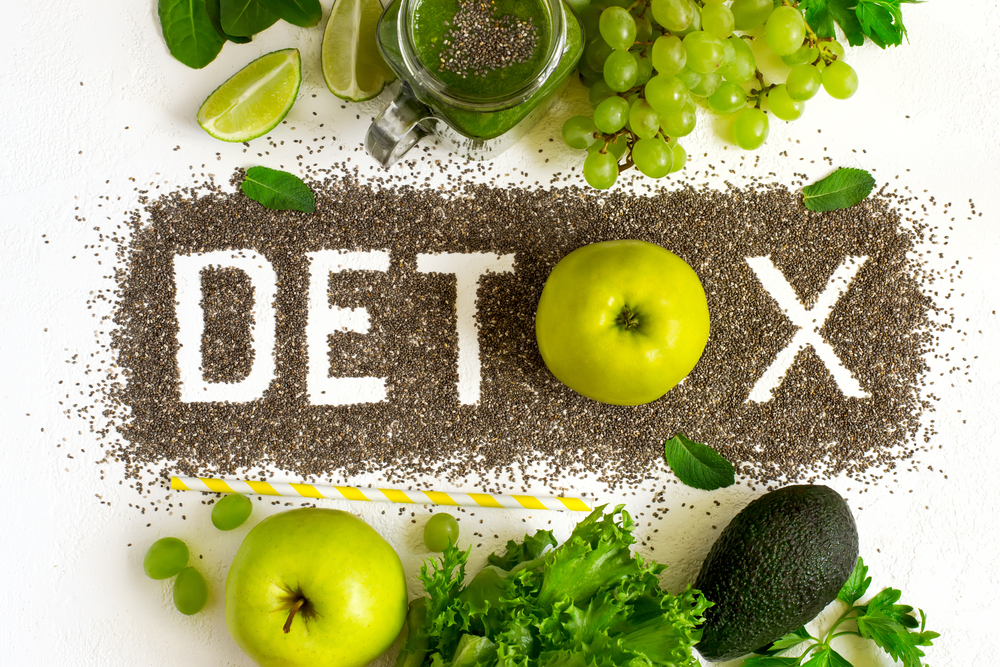If you’re feeling sluggish, slow, or zapped of energy, chances are you’re wondering how to detox your body and get yourself back on track. There are so many “detox diets” and regimens out there, but the truth is that the best way to detoxify your body is by using practical, commonsense tips.
Detoxification sounds mysterious and even a little frightening, but it’s very good for your system. So if you’re ready to learn how to detox your body at home, here’s are 9 steps to help you get started.

How to Detox Your Body at Home, Naturally
Many resources, supplements, diets, and tonics out there claim the best way to detox your body. But why does your body need to be detoxified in the first place?
Our bodies have wonderful ways of cleansing themselves and keeping all systems up and running smoothly. Our digestive tract, endocrine system, kidneys, liver, blood, and lymphatic systems move fluids through our bodies and, with them, toxins from our environment, foods, and more. Now, most of the time, these systems and organs do a fantastic job on their own, but it can help to give them some extra assistance, especially after we’re coming off a stressful time, illness, or a period of excess (like the holidays).
You may have seen detoxification diets and detox solutions at different spas and retreats. Often, these centers simply provide a place where you can recuperate, rest, and heal your body so it can detoxify itself and feel better. They may offer certain drinks, supplements, and services that can help you speed up the detoxification process, but most of these steps you can take to detox your body at home.
Why are our bodies so full of toxins in the first place? For most of us, it’s a combination of factors from our environments to our lifestyles and diets. We may eat foods that have been grown with pesticides and processed with chemicals. Packaging and other items that we interact with can off-gas chemicals into our environment, foods, and bodies. Our water, if unfiltered, may include heavy metals and even some contaminants from our environment. The air around us contains pollutants; cars burn fuel. We put chemical compounds onto our skin in the form of cosmetics, household cleaners, fragrances, and more.
Now, none of this is meant to scare you. Toxins in our environment surround us all, and most of the time, our bodies do a great job of filtering out what’s not needed. But when we’re stressed out, tired, and worn down, we may have a more challenging time getting rid of these unneeded contaminants. Moreover, when we have been drinking a lot of alcohol, eating heavily processed and preserved foods, or exposing ourselves to more environmental hazards than usual, we may start to feel exhausted. Our bodies need some help to get back on track.
Detoxing your body is a great practice to undertake periodically. It can help you regulate your digestive system, reclaim your sleep, and revamp your diet. You may lose weight during detoxification because your body often holds onto sodium, sugar, and water. The detox process allows it to let go and move these items out of your system.
As a result of detoxing, you’ll likely have more energy, feel better, and experience less illness and exhaustion. I recommend following a detox for one week to begin. If you’re familiar with the detoxification process, you could try it for a whole month. I recommend people detox for about a month each year to reset their system. January is often an excellent time because it’s a great way to jump-start your “healthier lifestyle” resolution (but any month of the year works)!
If you’re ready to learn how to detox your body, follow these 9 steps to get back on track.
1. Drink Plenty of Water
It sounds intuitive enough, but most of us forget to drink water. We should get 8-10 glasses (8 oz servings) of water per day. Ideally, filtered water will help you ensure that you’re not getting contaminants from pipes and the local environment in your water. If that is a concern for you, you can request water testing from your county health department.
For an extra boost, you can squeeze a small amount of lemon juice into your water as well. Lemon helps to boost your metabolism and aid in your digestion. In addition, it offers vitamin C, which is an antioxidant, easing stress on your body. The lemon also makes the water more palatable (for those who aren’t crazy about drinking plain water). Finally, many people report that lemon water helps their skin look clearer and brighter and boosts energy.
Water itself is excellent for your body. It helps move everything through your system and keeps you feeling healthy. Many people mistake the effects of dehydration, which can include stomach cramps, headaches, and brain fog. If you feel like you’re hungry, you may be dehydrated. Drink a glass or two of water and see how you feel after.
2. Get Plenty of Quality Sleep
Another essential step in detoxing your body is to get eight hours of high-quality sleep. Good sleep is crucial during the detoxification process because sleep allows our body to rest and refresh our systems. Our brain flushes out chemicals during sleep, including beta-amyloid, which is thought to contribute to Alzheimer’s disease.
If you struggle with sleep, you aren’t alone. According to the American Sleep Association, as many as 50-70 million adults suffer from sleep disorders. When we don’t get a good night of rest, we might feel unfocused, cranky, or extra sensitive.
If you want to get a better night of sleep, be sure to practice good sleep hygiene. Darken the room and be sure that you have a quiet space to sleep. Stay off your phone and away from screens for at least an hour before bed. Keep the room cool. If you can’t sleep, get up and go to another space, where you can engage in a quiet activity (like reading) until you become drowsy. You can also find relief with a calming cup of tea and diffusing soothing lavender oil before bed.
3. Get Moving
A common worry about detoxing the body is that you’ll feel tired or hungry during the process. This couldn’t be further from the truth. Yes, it can take a few days for your body to adjust to a detox diet, but once you begin, you’re likely going to feel a burst of energy.
Channel that vigor into exercise. When you move your body, you’ll help boost your metabolism, and in turn, you’ll get everything to work its way through your system. Sweat can also help you detoxify (it’s another way your body releases waste), so exercise is an ideal choice, especially if it’s something you regularly enjoy.
If you’re starting an exercise regimen, be sure to ease into the process. Try a short period of cardio followed by gentle stretching and resistance training. You may want to explore yoga, which can be very beneficial to the body and support the processes of your system. Even a walk will keep you moving and help you feel connected with your body.
4. Take a Break from Alcohol
One of the major steps for detoxing your body is cutting out alcohol. I know this step can be a challenge for many people, especially when there are many benefits to an occasional glass of wine or even beer. But when you’re going through detoxification, you’ll want to give your liver the extra boost by eliminating alcohol.
Our livers process alcohol. It is toxic to our bodies (even though it can also be part of an enjoyable and healthy lifestyle in moderation). Alcohol can kill microorganisms and bacteria, which is why it can be used to sterilize. As it is processed in the body, it becomes acetaldehyde, which is even more toxic.
During the detoxification process, you’ll need to avoid alcohol. Fortunately, a week or even a month is not such a long time. You may feel so much better after detoxing your body that you want to keep the effects going and reduce your alcohol consumption permanently.
5. Cut out Sugar and Processed Foods
Cutting out sugar and processed foods is a big step toward your overall health. Now, realistically, it’s very challenging to cut sugar from your diet completely. Still, by reducing your consumption significantly (omitting it for a week to a month), you’ll notice some significant changes pretty quickly.
Processed foods are any food items that are made and packaged, as opposed to “whole” foods. Some foods are minimally processed—when the ingredient list is very short or the food is quite close to its natural state. For example, an organic apple is unprocessed, 100% unsweetened organic applesauce is minimally processed, a packaged apple pastry is highly processed. Look for foods that are as whole as possible.
Fresh fruits and vegetables are best, of course. Frozen organic vegetables are often nutrient-rich and minimally processed. Whole grains—organic oats, barley, quinoa, and other grains are often a good choice. Beans, lentils, and other legumes are also excellent. For meat and dairy, seek foods that are natural, organic, and as unprocessed as possible.
6. Get More Fiber
Let’s talk a little bit about elimination. Yes, I mean poo. It’s something that most of us don’t want to talk about, but many of us aren’t moving food and waste through our bodies as efficiently as we could. Part of the detoxification process includes boosting your digestive system and gut health, which means getting your body on a regular elimination cycle.
When you cleanse your gut of backed-up poop, you’ll most likely lose 5-15 lbs. in about two weeks. Once things are moving along smoothly, you’ll feel much better, less bloated, less sluggish, and more energetic. I recommend zuPoo Colon Cleanse as my go-to cleansing aid. It’s very gentle, but it really helps if you suffer from constipation. (Incidentally, their website is helpful and pretty hilarious. Don’t miss the review comments either!)
If regularity is frequently an issue for you, I also recommend Melaleuca FiberWise. This product can be taken all the time, even when you aren’t detoxing your body. It helps people with digestive health and in clearing out all those toxins and junk from your system. It’s especially helpful if you suffer from bloating and other digestive woes.
7. Focus on Antioxidant-Rich Foods
Food is medicine, and many foods contain beneficial antioxidant properties that can help boost your overall health and wellness. Oxidative stress contributes to aging, the formation of cancer, and many other illnesses, so incorporating antioxidant-rich foods will really help.
Berries are an excellent source of antioxidants. Strawberries, blueberries, raspberries, and goji berries are excellent choices for combating free radicals that are given off during the oxidation process. Green tea is another excellent antioxidant. Dark chocolate is on the list, too, along with kale, beets, beans, spinach, red cabbage, and vitamin-C-rich foods.
If you’re focusing on detoxing your body, keep these foods in heavy rotation during your detox period. While they can be a great part of a healthy balanced diet all the time, during a detox, they are especially important. Many of these foods are also fiber-rich, high in vitamins, and of course, delicious.
8. Cut Back on Salt
Sodium can make you retain water, which in turn reduces your weight loss and hampers your body’s ability to flush out toxins. While some sodium is an inevitable part of most diets, cutting back on processed foods will also help reduce your salt intake.
A diet that’s high in salty foods can lead to high blood pressure. Salt can also make you feel a little slowed down and sluggish due to water retention. Drinking plenty of water will naturally help your body flush out the excess sodium, but it’s a good idea to take a break from added salt while you detox.
How do you flavor your food instead? There are many great flavorings you can add to your foods that will make you forget all about salt. Try vinegar or lemon juice for a tang. Garlic, onions, and even salsa can boost the flavors of food without added sodium. If you’re a spice lover, add black pepper, paprika, chili powder, cayenne pepper, or low-sodium hot sauce to your foods. Spice up stirfry with liquid coconut aminos, kelp or bonito flakes, or mushroom “umami” powder (check for no added salt or MSG). Finally, fresh herbs are always a fantastic and flavorful choice.
9. Eat Plenty of Prebiotics
Prebiotics help support the good bacteria that live in your gut. While probiotics get a lot of attention, prebiotics are the food that helps to support them. So if you want to keep your digestive system healthy and happy, you’ll need to be sure to include lots of prebiotic foods.
While some prebiotic foods like dandelion greens and chicory root may not be on your regular menu, many common foods are also on the list. Garlic is high in prebiotics, as are onions and leeks. Apples, bananas, oats, mushrooms, asparagus, and barley are excellent choices for prebiotic-rich diets.
Chickpeas and lentils also make the list of prebiotic foods. Consider making a delicious curry, a yummy soup, or enjoying a prebiotic-rich salad. Incorporate some antioxidant foods into the mix, and you’ll be helping your body detox (without feeling deprived at all).
Detoxing your body shouldn’t feel like a punishment. It’s a wonderful way to help your body thrive and run at optimal health. If you’re considering a detox, I highly recommend following the 9 steps to detoxing your body here for at least a week. See how you feel and then slowly resume your regular diet and lifestyle.
You may find that you enjoy the boost of energy and wellness so much that you make detoxing a regular part of your routine.
For more on health and wellness, don’t miss:







